
The United States Conference of Catholic Bishops (USCCB) is the episcopal conference of the Catholic Church in the United States. Founded in 1966 as the joint National Conference of Catholic Bishops (NCCB) and United States Catholic Conference (USCC), it is composed of all active and retired members of the Catholic hierarchy in the United States and the territory of the U.S. Virgin Islands.
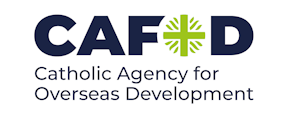
The Catholic Agency for Overseas Development, commonly known as CAFOD, is an international development and relief charity. It is the official aid agency of the Catholic Church in England and Wales.
The Litany of the Saints is a formal prayer of the Roman Catholic Church as well as the Old Catholic Church, Lutheran congregations of Evangelical Catholic churchmanship, Anglican congregations of Anglo-Catholic churchmanship, and Western Rite Orthodox communities. It is a prayer to the Triune God, which also includes invocations for the intercession of the Blessed Virgin Mary, the Angels and all the martyrs and saints upon whom Christianity was founded, and those recognised as saints through the subsequent history of the church. Following the invocation of the saints, the Litany concludes with a series of supplications to God to hear the prayers of the worshippers. It is most prominently sung during the Easter Vigil, All Saints' Day, and in the liturgy for conferring Holy Orders, the Consecration of a Virgin and reception of the perpetual vows of a religious or a diocesane hermit.
The Anglican–Roman Catholic International Commission (ARCIC) is an organization created in 1969 which seeks to make ecumenical progress between the Anglican–Catholic dialogue. The sponsors are the Anglican Consultative Council and the Pontifical Council for Promoting Christian Unity.

Vincent Gerard Nichols is a British cardinal of the Roman Catholic Church, Archbishop of Westminster and President of the Catholic Bishops' Conference of England and Wales. He previously served as Archbishop of Birmingham from 2000 to 2009. He was created cardinal in 22 February 2014.
Instruction Concerning the Criteria for the Discernment of Vocations with Regard to Persons with Homosexual Tendencies in View of Their Admission to the Seminary and to Holy Orders is a document published in November 2005 by the Congregation for Catholic Education, one of the top-level offices of the Catholic Church.
Ordinatio sacerdotalis is an apostolic letter issued by Pope John Paul II on 22 May 1994. In this document, John Paul II discussed the Catholic Church's position requiring "the reservation of priestly ordination to men alone" and wrote that "the Church has no authority whatsoever to confer priestly ordination on women". While the document states that it was written so "that all doubt may be removed regarding a matter of great importance", it has been contested by some Catholics, as to both the substance and in the authoritative nature of its teaching.
Summorum Pontificum is an apostolic letter of Pope Benedict XVI, issued in July 2007. This letter specifies the circumstances in which priests of the Latin Church could celebrate Mass according to what Benedict XVI called the "Missal promulgated by Blessed John XXIII in 1962" and administer most of the sacraments in the form used before the liturgical reforms that followed the Second Vatican Council.

Blase Joseph Cupich is an American prelate of the Catholic Church, a cardinal who serves as archbishop of the Latin Church Archdiocese of Chicago.
The Church policies after World War II of Pope Pius XII focused on material aid to war-torn Europe, the internationalization of the Roman Catholic Church, its persecution in Eastern Europe, China and Vietnam, and relations with the United States and the emerging European Union.
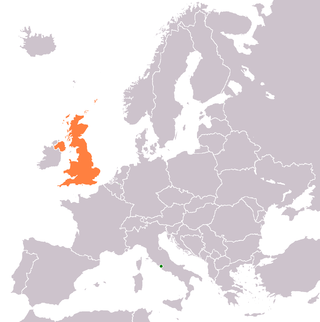
Holy See–United Kingdom relations are foreign relations between the Holy See and the United Kingdom.

Declan Ronan Lang is an English prelate of the Roman Catholic Church. He served as the ninth bishop of Clifton from 2001-2024.
The ecclesiastical response to Catholic sexual abuse cases is a major aspect of the academic literature surrounding the Church's child sexual abuse scandal. The Catholic Church's response to the scandal can be viewed on three levels: the diocesan level, the episcopal conference level and the Vatican. Responses to the scandal proceeded at all three levels in parallel with the higher levels becoming progressively more involved as the gravity of the problem became more apparent.
A personal ordinariate for former Anglicans, shortened as personal ordinariate or Anglican ordinariate, is a canonical structure within the Catholic Church established in order to enable "groups of Anglicans" and Methodists to join the Catholic Church while preserving elements of their liturgical and spiritual patrimony.
The Curial response to Catholic sexual abuse cases was a significant part of the Church's response to Catholic sexual abuse cases. Its policies have shifted from favoring secrecy in the 20th century to active reform and apologies in the 21st century. Under the current leadership of Pope Francis, the issue has been addressed through direct instructions to report cases of sexual abuse and revoking the former policies of secrecy.
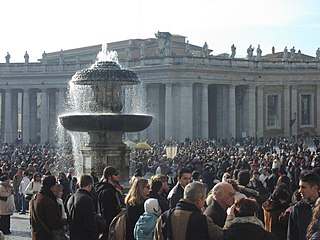
Catholic laity are the ordinary members of the Catholic Church who are neither clergy nor recipients of Holy Orders or vowed to life in a religious order or congregation. Their mission, according to the Second Vatican Council, is to "sanctify the world".
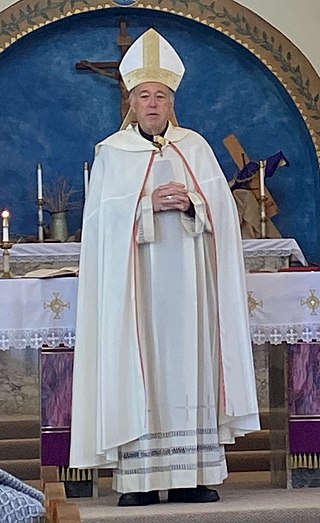
Robert Walter McElroy is an American prelate of the Catholic Church who has served as the sixth bishop of the Diocese of San Diego in California since 2015.

Within Christianity, there are a variety of views on the issues of gender identity and transgender people. Christian denominations vary in their official position: some explicitly support gender transition, some oppose it, and others are divided or have not taken an official stance. Within any given denomination, individual members may or may not endorse the official views of their church on the topic.
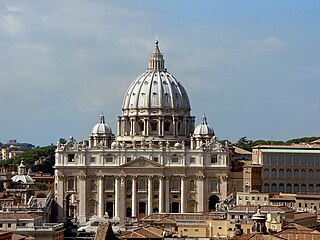
The 15th Ordinary General Assembly of the Synod of Bishops, commonly referred to as the Synod on Young People, is a Roman Catholic synod that took place 3–28 October 2018 and had as its theme "Young People, Faith, and Vocational Discernment". Its aim was to "accompany young people on their way of life towards maturity so that, through a process of discernment, they can discover their life project and realize it with joy, opening the encounter with God and with men, and actively participating in the building up of the Church and society".
The Synod of Bishops for the Pan-Amazon region, commonly referred to as the Amazon synod, met in Rome from 6 to 27 October 2019. Pope Francis announced on 15 October 2017 that a special assembly of the Synod of Bishops would work "to identify new paths for the evangelization of God's people in that region", specifically the indigenous peoples who are "often forgotten and without the prospect of a serene future".









